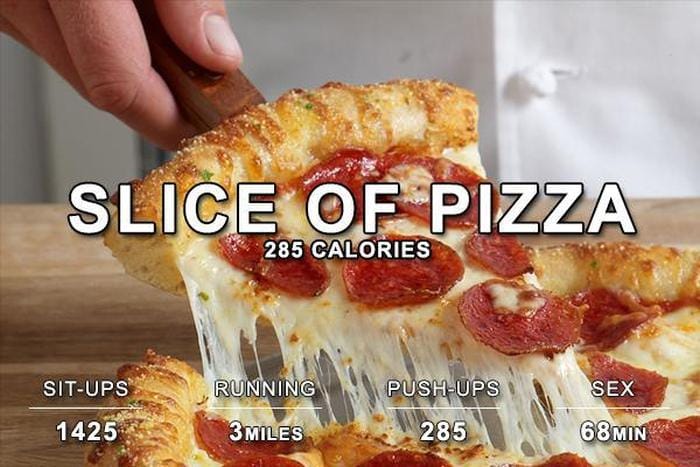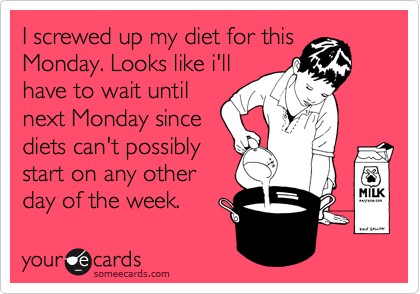In an ideal world, everyone would eat in a way which enables them to accomplish their physique goals, achieve optimal health, eat their favourite foods without restriction or guilt, and have a perfectly healthy relationship with their body.
But this is the real world, and the aforementioned situation is rare. Most people struggle with an all-or-nothing mentality. Instead of experimenting to find the perfect nutritional strategy which can be seamlessly incorporated into their lifestyle, these people follow a plan which is too restrictive and inevitably leads to failure.
After veering from their scheduled nutrition plan just once, many people find it hard to stop. What could have been an easily rectified single slip-up turns into a period of eating everything in sight or, even worse, a complete abandonment of the plan altogether. This can lead to bingeing, negative self talk, and even avoidance of exercise.
Although I try to make my nutrition plans as flexible, sustainable and high in calories as possible, some of my clients occasionally fall off the wagon. This is usually triggered by events such as vacations, break-ups, family illnesses, job redundancies, or past negative relationships with food.
One night of eating pizza and ice cream can quickly turn into someone saying “eff it” and eating everything they shouldn’t. Before they know it, is has been weeks since they made it through a day without junk food.
While I am all for eating everything in moderation, most people will generally feel better both physically and mentally if their diet predominantly consists of lean proteins, complex carbohydrates, healthy fats and an abundance of fruits and vegetables. Conversely, if someone lives off junk food, they will typically experience poor energy levels, mood swings, and low body confidence, to name a few.
After falling off track for an extended period of time, many people feel embarrassed and ashamed. They find themselves stuck in an awful cycle, where they either eat to make themselves feel better or continue making poor food decisions given that they have already done so, to only end up feeling worse.
If you find yourself struggling to get back on track with eating healthy, here are five ways to feel better.
1. Let go of the all-or-nothing mindset
After a prolonged period of eating off-plan, do not try to force yourself straight back into a strict eating regimen. Instead, focus on making small changes one step at a time. For example, try adding a serving of vegetables to each meal for a whole week, and then try to cut out all non-water beverages the following week.
Achieving small goals in this manner builds confidence and momentum, and you are more likely to succeed than if you tried to fix everything at once.
 2. Do not punish yourself with exercise
2. Do not punish yourself with exercise
What’s done is done, and today is a new day. There is no use beating yourself up with hours of cardio in an attempt to undo your excessive eating. It will not help, and it will only make you feel worse about yourself.
These kind of things make me crazy – you don’t “have to” do anything after eating any kind of food!
Exercise should be enjoyable! Train in a way which supports your goals and makes you feel confident about your body – whether that is lifting weights, hiking, dancing, doing yoga, or something else.
3. Avoid negative self-talk
Instead of chastising yourself for your lack of willpower, accept what has transpired and move on. Remind yourself that these things happen to the best of us, and try to forget about it as quickly as possible.
Although it can be useful to consider the circumstances which caused you to reach for less healthy foods in order to avoid a relapse in the future, you should not do this in a way which makes you feel guilty for falling off the wagon. Reflect on your behaviour only if you can do so objectively.
4. Try to change things as quickly as possible
If you slip up and eat an entire cake on Friday night, it can be tempting to throw in the towel for the rest of the weekend. Monday is the only day to commence or resume a nutrition plan, after all (<< sarcasm).
 Instead, wake up on Saturday morning and get right back into your meal plan. If it helps, write out your planned meals on a piece of paper, and check them off as you get through them. Doing so can give you a great sense of accomplishment, and seeing physical evidence of your adherence will boost your self confidence and give you the momentum to continue.
Instead, wake up on Saturday morning and get right back into your meal plan. If it helps, write out your planned meals on a piece of paper, and check them off as you get through them. Doing so can give you a great sense of accomplishment, and seeing physical evidence of your adherence will boost your self confidence and give you the momentum to continue.
5. Make your nutrition plan more flexible
If you are repeatedly falling off your plan and indulging in foods you should not be eating, then something needs to change. Create a plan which enables you to incorporate your favourite foods in moderation. As I have said before, labelling foods as “allowed” and “off-limits” only makes you crave the latter more.
Ask yourself if you could follow your nutrition plan day in and day out for the rest of your life. If the answer is no, your plan is too restrictive. If bikini competitors can eat donuts and ice cream leading up to a competition, you can find a way to include your favourite foods too!
With Love From the Trench Kitchen,
xoxoErika♥










